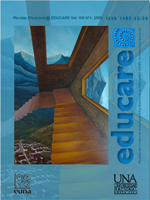Multiplicando esfuerzos para fortalecer la familia desde la orientación
DOI:
https://doi.org/10.15359/ree.13-1.7Keywords:
counseling, family, parents, school, non formal educationAbstract
The proposal includes the systematization of a training experience where 35 teaching and administrative officials participated. They came from 9 elementary schools located in marginal communities, developed by a team of two school counselors whose main purpose was to encourage among the participants the development of skills that will let them design and apply activities in the field of “parents’ school”.
Thus, an educational counseling proposal has been modeled in order to reach greater coverage and efficiency of the counseling work with families being done from within the school. Moreover, what’s being sought is the promotion of healthy family relationships that contribute to the family’s wholeness and well being and therefore to the appropriate academic and social development of their children.
References
Cascante, I. (1992). Breve reseña de la carrera de Orientación. Escuela de Orientación Educativa.
Universidad Nacional. II Jornada de Orientación Vocacional Profesional. Heredia, Costa
Rica: Universidad Nacional.
Cascante, V., Mora, J. & Pizarro, A. (1996). Estrategias que relacionan a los padres de familia con
el proceso de Enseñanza y Aprendizaje en el C.T.P.A. Carrillo Circuito 05 Región Educativa
Santa Cruz. Tesis. Universidad de Costa Rica.
Castells, P. (1997). La familia ¿Está en crisis? Barcelona, España: Plaza & Janés Editores.
Consejo Nacional de Rectores (CONARE) y Ministerio de Educación Pública (MEP). (1992). La
Orientación del siglo XXI. II Jornada de Orientación Vocacional Profesional. Heredia:
Oficina de Publicaciones Universidad Nacional
Monereo, C. & Solé, I. (1996). El asesoramiento psicopedagógico: una perspectiva profesional y
constructivista. Madrid, España: Alianza.
Pereira, M. T. (2004). Orientación educativa. San José, Costa Rica: EUNED.
Proyecto Estado de la Nación en Desarrollo Humano Sostenible. (2006). Resumen del Duodécimo
Informe Estado de la Nación en Desarrollo Humano Sostenible. San José, Costa Rica:
Autor.
Rockwell, R. (1995). Parents and Teachers as partners. Texas, United States: Fort Worth.
Salas, E. (1992). ¿Cómo orientar? Santiago, Chile: Universitaria.
Sanz, O. (2001). Orientación psicopedagógica y calidad educativa. Madrid, España: Pirámide
Ediciones.
Villarreal, C. (1992). La orientación familiar: una opción educativa. Revista Educación, Vol.16, N°
, 51-63.
Villarreal, C. (Compil.). (1997). Memoria del Seminario La orientación familiar: hacia una nueva
perspectiva de vida en familia, realizado en 1995 en la Facultad de Educación de la UCR
(iniciativa de la Escuela de Orientación y Educación Especial de la UCR, como un programa
de acción social y en coordinación con el Departamento de Orientación y Vida Estudiantil
del MEP). San José, Costa Rica: Universidad de Costa Rica.
Villarreal, C. (2001). La humanización de la familia: una responsabilidad educativa. Revista
Educación, Vol. 25, Nº1, 137-150.
Zamudio, L. (febrero/marzo, 2008). Un trabajo por la familia, en el contexto municipal. Red de
Gestores Sociales, 36. Recuperado el 3 de abril, 2009, de www.rgs.gov.co/img_upload/ca2aff77eed2a9b504622b634052d133/RGS38_070508color___FINAL.pdf
Downloads
Published
How to Cite
Issue
Section
License
1. In case the submitted paper is accepted for publication, the author(s) FREELY, COSTLESS, EXCLUSIVELY AND FOR AN INDEFINITE TERM transfer copyrights and patrimonial rights to Universidad Nacional (UNA, Costa Rica). For more details check the Originality Statement and Copyright Transfer Agreement
2. REUTILIZATION RIGHTS: UNA authorizes authors to use, for any purpose (among them selfarchiving or autoarchiving) and to publish in the Internet in any electronic site, the paper´'s final version, both approved and published (post print), as long as it is done with a non commercial purpose, does not generate derivates without previous consentment and recognizes both publisher's name and authorship.
3. The submission and possible publication of the paper in the Educare Electronic Journal is ruled by the Journal’s editorial policies, the institutional rules of Universidad Nacional and the laws of the Republic of Costa Rica. Additionally, any possible difference of opinion or future dispute shall be settled in accordance with the mechanisms of Alternative Dispute Resolution and the Costa Rican Jurisdiction.
4. In all cases, it is understood that the opinions issued are those of the authors and do not necessarily reflect the position and opinion of Educare, CIDE or Universidad Nacional, Costa Rica. It is also understood that, in the exercise of academic freedom, the authors have carried out a rogorous scientific-academic process of research, reflection and argumentation thar lays within the thematic scope of interest of the Journal.
5. The papers published by Educare Electronic Journal use a Creative Commons License:















 The articles published by Educare Electronic Journal can be shared with a Creative Commons License:
The articles published by Educare Electronic Journal can be shared with a Creative Commons License: 



